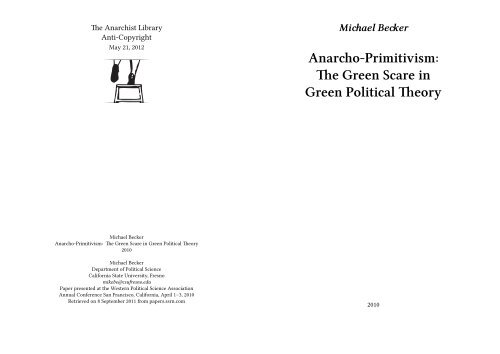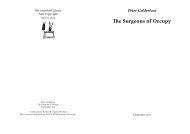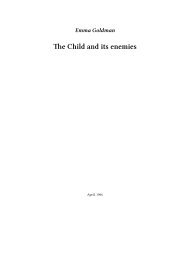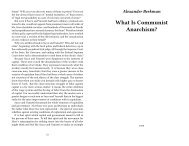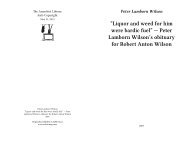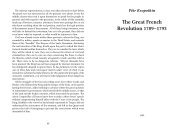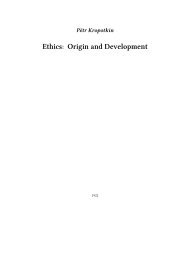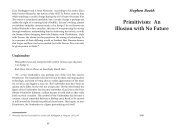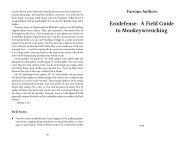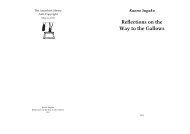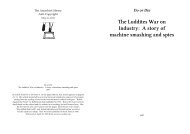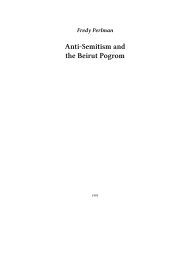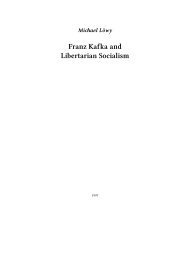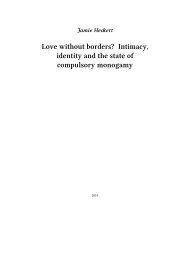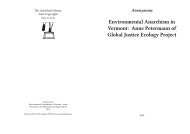Anarcho-Primitivism: The Green Scare in Green Political Theory
Anarcho-Primitivism: The Green Scare in Green Political Theory
Anarcho-Primitivism: The Green Scare in Green Political Theory
Create successful ePaper yourself
Turn your PDF publications into a flip-book with our unique Google optimized e-Paper software.
<strong>The</strong> Anarchist Library<br />
Anti-Copyright<br />
May 21, 2012<br />
Michael Becker<br />
<strong>Anarcho</strong>-<strong>Primitivism</strong>: <strong>The</strong> <strong>Green</strong> <strong>Scare</strong> <strong>in</strong> <strong>Green</strong> <strong>Political</strong> <strong>The</strong>ory<br />
2010<br />
Michael Becker<br />
Department of <strong>Political</strong> Science<br />
California State University, Fresno<br />
mikebe@csufresno.edu<br />
Paper presented at the Western <strong>Political</strong> Science Association<br />
Annual Conference San Francisco, California, April 1–3, 2010<br />
Retrieved on 8 September 2011 from papers.ssrn.com<br />
Michael Becker<br />
<strong>Anarcho</strong>-<strong>Primitivism</strong>:<br />
<strong>The</strong> <strong>Green</strong> <strong>Scare</strong> <strong>in</strong><br />
<strong>Green</strong> <strong>Political</strong> <strong>The</strong>ory<br />
2010
Contents<br />
Introduction . . . . . . . . . . . . . . . . . . . . . . . . . . . . . . . . . . . . . . . . . . . 5<br />
I. Errant Bio-Centrism . . . . . . . . . . . . . . . . . . . . . . . . . . . . . . . . . . . 7<br />
II. “Nature”: Reified Space-Time . . . . . . . . . . . . . . . . . . . . . . . . . . 13<br />
III. Conclusion: Zeks and Renegades . . . . . . . . . . . . . . . . . . . . . . 20<br />
Works Cited . . . . . . . . . . . . . . . . . . . . . . . . . . . . . . . . . . . . . . . . . . 24<br />
3
Faun, Feral, “Feral Revolution” <strong>in</strong> Demolition Derby #1, 1988, p. 30;<br />
www.<strong>in</strong>surgentdesire.org.uk<br />
Heidegger, Mart<strong>in</strong>. <strong>The</strong> Question Concern<strong>in</strong>g Technology. www.lcc.gatech.edu<br />
classes/read<strong>in</strong>gs/Heidegger/heidegger_techquestion2.pdf<br />
He<strong>in</strong>berg, Richard. <strong>The</strong> Primitivist Critique of Civilization. A paper presented<br />
at the 24 th annual meet<strong>in</strong>g of the International Society for the<br />
Comparative Study of Civilizations at Wright State University, Dayton,<br />
Ohio, June 15, 1995.<br />
Jensen, Derrick.A Language Older than Words. New York: Context Books,<br />
2000.<br />
McKibben, Bill.<strong>The</strong> End of Nature. New York: Anchor Books, 1989.<br />
Mill, John Stuart,On Liberty. See chapter five. www.constitution.org<br />
Mill, John Stuart.On Nature. www.lancs.ac.uk<br />
Moore, John, “Com<strong>in</strong>g Home: Def<strong>in</strong><strong>in</strong>g <strong>Anarcho</strong>-<strong>Primitivism</strong> with John<br />
Moore,” www.<strong>in</strong>surgentdesire.org.uk<br />
Perlman, Fredy.Aga<strong>in</strong>st History, Aga<strong>in</strong>st Leviathan. Detroit: Black and<br />
Red Press, 1983.<br />
Platt, Rutherford H ed. <strong>The</strong> Forgotten Books of Eden. New York: Bell<br />
Publish<strong>in</strong>g, 1980.<br />
Regan, Tom,<strong>The</strong> Case for Animal Rights. New York: Routledge, 1984.<br />
Rousseau,<strong>The</strong> Social Contract and Discourse on the Orig<strong>in</strong> of Inequality.<br />
trans. and ed. Lester G. Crocker. New York: Wash<strong>in</strong>gton Square Press,<br />
1978.<br />
Shepard, Paul.<strong>The</strong> Tender Carnivore and the Sacred Game. New York:<br />
Charles Scribners Sons, 1973.<br />
S<strong>in</strong>ger, Peter.Animal Liberation. 2 nd ed. London: Thorsons, 1991.<br />
Taylor, Paul.Respect for Nature: A <strong>The</strong>ory of Environmental Ethics. Pr<strong>in</strong>ceton,<br />
New Jersey: Pr<strong>in</strong>ceton University Press, 1986.<br />
Tucker, Kev<strong>in</strong>. www.<strong>in</strong>surgentdesire.org.uk<br />
Watson, David,Civilization <strong>in</strong> Bulk. www.<strong>in</strong>surgentdesire.org.uk<br />
Zerzan, John.Elements of Refusal. Seattle: Left Bank Books, 1988.<br />
Zerzan, John. “Time and its Discontents” (repr<strong>in</strong>ted from Anarchy: A Journal<br />
of Desire Armed. #39, W<strong>in</strong>ter ‘94.) www.<strong>in</strong>surgentdesire.org.uk<br />
4 25
sensuous world seems to rema<strong>in</strong>. <strong>The</strong> only alternative is to attack the<br />
mach<strong>in</strong>e itself.<br />
Smash<strong>in</strong>g down the walls of civilization <strong>in</strong>volves liberation from even<br />
the most basic conceptual constra<strong>in</strong>ts that tame the wildness <strong>in</strong> humans.<br />
It is the liberation of “vital energy,” “free-spirited wildness,” and “the<br />
<strong>in</strong>tense, passionate life of untamed freedom.” <strong>The</strong> walls must be smashed<br />
because the sum of all walls is “everyth<strong>in</strong>g we call civilization, everyth<strong>in</strong>g<br />
that comes between us and the direct, participatory experience of the<br />
wild world.” (Faun, “Feral”). Conventionally, the green scare is thought<br />
of as Leviathan’s campaign of repression aga<strong>in</strong>st those who smash walls.<br />
Leviathan terms smash<strong>in</strong>g walls “eco-terrorism.” As usual, the truth<br />
is exactly opposite of the civilized version. Ecology derives from the<br />
Greekoiko or home. It is the same root as economics, and the affluence<br />
of orig<strong>in</strong>al cultures stemmed from the fact that their place of sustenance<br />
was simultaneously the place of their most <strong>in</strong>timate relations, their home.<br />
But that primordial home, for green theorists is a world apart from human<br />
civilization. It is an old and basic and ferocious error. <strong>The</strong> thought of<br />
rectify<strong>in</strong>g it is terrify<strong>in</strong>g. In this sense the green scare is the fear struck<br />
<strong>in</strong>to the hearts of the civilized, green political theorists. It is the fear that<br />
<strong>in</strong>heres <strong>in</strong> the knowledge that we can, <strong>in</strong>deed that we must, fall back<br />
from civilization <strong>in</strong>to the place where we grew up as humans, the place<br />
we belong, the home that is called earth.<br />
Works Cited<br />
Bookch<strong>in</strong>, Murray. “Social Anarchism or Lifestyle Anarchism: An Unbridgeable<br />
Chasm.” dwardmac.pitzer.edu<br />
Chomsky, Noam.Chomsky on Anarchism. Oakland, California: AK Press,<br />
2005.<br />
Faun, Feral, “Nature as spectacle: <strong>The</strong> image of wilderness vs. wildness”<br />
Feral Faun; “Anarchy: A Journal Of Desire Armed” Issue #29 Summer<br />
1991. www.<strong>in</strong>surgentdesire.org.uk<br />
Faun, Feral. “<strong>The</strong> Liberation of Motion Through Space” www.<strong>in</strong>surgentdesire.org.uk<br />
24<br />
Introduction<br />
Today, the fall from grace is evaporat<strong>in</strong>g, even as metaphor. <strong>The</strong> shot<br />
at primordial redemption threatens to slip <strong>in</strong>to the simulacrum. <strong>The</strong><br />
magnitude of alienation from nature and the extent of mediated life is<br />
colossal. Fall<strong>in</strong>g away from primitive orig<strong>in</strong>s has led, f<strong>in</strong>ally, <strong>in</strong>to an<br />
abyss of artificially reproduced existence and mean<strong>in</strong>glessness. But, the<br />
hyper-technical recognizes noth<strong>in</strong>g external to it; the threat is thus not<br />
dis-closed. It is as if the capta<strong>in</strong>s of the Titanic not only fail to see the<br />
icebergs but refuse to recognize the sea.<br />
Cybernetic life dispenses with a basic dialectical tension between<br />
civilization and primitive existence that has always appeared <strong>in</strong> the consciousness<br />
of civilized cultures. 1 For the AI or genetics eng<strong>in</strong>eer such a<br />
split simply does not exist. <strong>The</strong>re is no nature and no primitive. Humans<br />
are <strong>in</strong> no essential way a part of nature. On the contrary human dest<strong>in</strong>y<br />
is fulfilled when the body and m<strong>in</strong>d are synthesized with<strong>in</strong> a fully<br />
1 Zerzan notes that the idea of “an orig<strong>in</strong>al state of pleasure and perfection is very old<br />
and virtually universal” (Zerzan, “Elements,” 9). He<strong>in</strong>berg notes that the image of a lost<br />
golden age is central to all of the world’s religions and “one of the most powerful themes<br />
<strong>in</strong> human thought” (He<strong>in</strong>berg, “Critique”). What I am suggest<strong>in</strong>g is that the contrast<br />
between the “golden age” and the fallen world creates a tension that has provided the<br />
impetus for civilization’s expansion. Such tension provides the tragic force to Plato’s<br />
“Republic,” where justice is <strong>in</strong>herent <strong>in</strong> the simple, primitive “city of pigs” and, <strong>in</strong>evitably,<br />
a failed project <strong>in</strong> the civilized “city at fever heat.” It appears <strong>in</strong> the Eden story, where<br />
knowledge severs humans from the eternal presence of God and where the farmer-murderer<br />
Ca<strong>in</strong> is cast out, he and his descendants permanently marked. <strong>The</strong> dest<strong>in</strong>y for<br />
agri-culturalists is fear and loath<strong>in</strong>g by all the primitive peoples who they are compelled<br />
to destroy as they ra(n)ge over the entire face of the earth. August<strong>in</strong>e furnishes the<br />
correspond<strong>in</strong>g psychological account of the s<strong>in</strong>ners’ dread, the turn<strong>in</strong>g of the will away<br />
from God, the fullness of Life, toward a self which, <strong>in</strong> its own assertion, is Noth<strong>in</strong>g. It<br />
is evident <strong>in</strong> the various modern accounts of a state of nature. In Locke, money and<br />
property <strong>in</strong>equality alter humans’ satisfaction with <strong>in</strong>tr<strong>in</strong>sic values. Rousseau’s noble<br />
savage is orig<strong>in</strong>ally uncontam<strong>in</strong>ated by the vanity which constantly <strong>in</strong>tensifies with<br />
reason, property, and civilization. It is true that each of these theorists substitutes a<br />
compensatory and redemptive possibility (the Form of the Good, grace, material abundance,<br />
and the general will, respectively) for the loss of orig<strong>in</strong>al unity with Life. But the<br />
fact that these are illusions simultaneously <strong>in</strong>tensifies the anxiety of the civilized and<br />
deepens the agonic character of the prim-civ split.<br />
5
artificial environment. Paradoxically, the oblivion of natural existence<br />
is re<strong>in</strong>forced, philosophically and psychologically, by some of the most<br />
well known representatives of environmental theory and ethics. <strong>The</strong>ir<br />
conceptions of a liveable future are fully compatible with cybernetics.<br />
Take Paul Taylor’s “Respect for Nature.” Taylor argues for a truce between<br />
the human world, civilization, and the non-human, natural world.<br />
Nature is prist<strong>in</strong>e, untrammeled by humans. Human presence, by def<strong>in</strong>ition,<br />
negates the existence of the natural. As humans are fundamentally<br />
separate from nature, there is no conceivable reason why a cybernetic<br />
civilization, tak<strong>in</strong>g Taylor’s view, would be ethically objectionable so<br />
long as room is ma<strong>in</strong>ta<strong>in</strong>ed for separate, flourish<strong>in</strong>g eco-systems.<br />
But Taylor’s position — what I refer to as “green political theory” —<br />
reiterates the nihilism of cybernetics; it collapses all human existence<br />
<strong>in</strong>to civilization and thus aga<strong>in</strong> breaks the tension between civilized and<br />
primitive. As a rule, <strong>in</strong> Taylor and green political theory generally, still<br />
surviv<strong>in</strong>g and past primitive cultures are ignored. Were they recognized<br />
one assumes that they would be regarded as less than fully human, a<br />
k<strong>in</strong>d of proto-technological version of ourselves. By this occlusion, the<br />
consciousness of a tension between civilization and the primitive is<br />
broken. Even the memory of an orig<strong>in</strong>al unity of humans with natural<br />
existence is obliterated. <strong>The</strong> technological totality grows.<br />
<strong>Green</strong> anarchists and anarcho-primitivists, by contrast, highlight the<br />
tension, argu<strong>in</strong>g that civilization is an <strong>in</strong>herent threat to nature as a<br />
whole and to the wildness of our own nature as humans. 2 Rather than<br />
ignore the fall or accept it as irrevocable, green anarchists <strong>in</strong>sist that it is<br />
not just possible, but necessary, to re-imag<strong>in</strong>e and return to an existence<br />
embedded <strong>in</strong> unity with the liv<strong>in</strong>g flux of reality, the lifeworld common<br />
to all existence. At its center the fall is the rend<strong>in</strong>g of simultaneity<br />
with nature. <strong>The</strong> pre-theoretical, affective experience of the lifeworld<br />
was disrupted by basic, reified abstractions, most fundamentally notions<br />
of space and time. <strong>The</strong> fall is the substitution of abstraction for lived<br />
2 <strong>The</strong>re is a considerable range of viewpo<strong>in</strong>ts regard<strong>in</strong>g the proper response to modern<br />
technology and capitalism from arcology to primitivism. For the purposes of this paper<br />
the focus is on a common critique of the reified concepts, the exploitative techniques, and<br />
the systemic oppression, violence, and ecological destruction that comprise civilization.<br />
6<br />
armors his body and masks his face. Desensitization is the better part of<br />
valor.<br />
In the clos<strong>in</strong>g section of “Aga<strong>in</strong>st His-story” Perlman surveys the European<br />
conquest of turtle island. Ideologically, the old Puritanism becomes<br />
obsolete: “the language of salvation and damnation, of s<strong>in</strong> and the fall,<br />
becomes <strong>in</strong>creas<strong>in</strong>gly archaic <strong>in</strong> the land of endless frontiers, and it is<br />
more often an obstacle than a guide to enterpris<strong>in</strong>g <strong>in</strong>vaders.” (Perlman,<br />
“Aga<strong>in</strong>st,” 269). <strong>The</strong> ancestors of the “enterpris<strong>in</strong>g <strong>in</strong>vaders” will deliver<br />
us to the ultimate stage of civilization. <strong>The</strong>y will completely sever humanity<br />
from earth by construct<strong>in</strong>g artificial humans for an artificial human<br />
environment. Old tales of the fall from primitive immediacy with earth<br />
and animals is substituted for by a secular ideology called green political<br />
theory <strong>in</strong> which humans, perfectly civilized, will wall themselves off<br />
from a place called “nature.”<br />
For Perlman, the Puritans and their descendants hated slave-owners<br />
because they did not work and slaves because they “worked without<br />
conviction.” But who the Puritans resented above all were the renegades,<br />
those “fellow zeks who make themselves at home <strong>in</strong> the community<br />
of the cont<strong>in</strong>ent’s survivors.” <strong>The</strong>y hated them because they refused to<br />
work and because they “dispensed with the amenities that brand them<br />
as Human (he means civilized).” But it is the primitive who is human<br />
and the zek, who, <strong>in</strong> his devotion to the Leviathan, has lost his humanity.<br />
<strong>The</strong> zek sees <strong>in</strong> the face of the primitive and the renegade his own lost<br />
soul.<br />
Were the pioneer to admit their humanity, however briefly, however<br />
grudg<strong>in</strong>gly, his <strong>in</strong>nards would explode, his armor melt, his mask fall, for<br />
he would <strong>in</strong> that flash of light see himself as a zek, his freedom as selfenslavement,<br />
his market civilization as a forced labor camp. <strong>The</strong> devil<br />
would try to tempt him to become a Renegade and, irony of ironies, he<br />
would fall, unlike Eve out of blessed labor <strong>in</strong>to cursed Eden. (Perlman,<br />
268–269)<br />
In the anarcho-primitivist the green political theorist is confronted<br />
with the renegade, and he hates and fears her as much as his Puritan<br />
forebear hated the white Indian. But the primitive renegade today has no<br />
surviv<strong>in</strong>g community of <strong>in</strong>digenous survivors to escape to. <strong>The</strong> “amenities”<br />
of civilization seem <strong>in</strong>escapable. No tie to the timeless realm of the<br />
23
aff<strong>in</strong>ity of power and nature, as the twofold limitation on the doma<strong>in</strong> of<br />
culture, Indian societies were able to create a means for neutraliz<strong>in</strong>g the<br />
virulence of political authority. (Watson, “Civilization <strong>in</strong> Bulk”)<br />
Primitive cultures <strong>in</strong>corporated powerful norms <strong>in</strong> their stories and<br />
oral tradition that undercut the exact tendencies of civilized “order.” <strong>The</strong><br />
widespread stories of the trickster, coyote, and among the Pla<strong>in</strong>s Indians,<br />
iktomi, the spider, portray a self-centered, grasp<strong>in</strong>g fool whose outlandish<br />
schemes backfire and end up <strong>in</strong> ru<strong>in</strong>. Perlman notes the presence<br />
of the trickster “Wiske” <strong>in</strong> Potawatomi stories. As with other trickster<br />
figures there is a certa<strong>in</strong> ambiguity. He bears knowledge and techniques<br />
that are potentially constructive — <strong>in</strong> the case of Wiske, snowshoes,<br />
boats, spears and arrows — but <strong>in</strong> return he demands control and the<br />
loyalty of the people. But the Potowatomi know what to do: they exile<br />
him. Eventually, European <strong>in</strong>vaders will ask the Potowatami if Wiske<br />
ever “actually existed.” But this has no mean<strong>in</strong>g for the Potawatami. As<br />
Perlman puts it, “Wiske existed <strong>in</strong> the present,” and <strong>in</strong> their songs and<br />
ceremonies Wiske “was always a member of the community and he was<br />
always exiled.” (Perlman, 240–241) Reality is presence, and presence is<br />
rhythmic not l<strong>in</strong>ear.<br />
David Watson notes that a similar approach was used to keep the<br />
virulence of technique at bay. Through shamanism, primitive people<br />
“m<strong>in</strong>imized the relative weight of <strong>in</strong>strumental or practical techniques<br />
and expanded the importance of techniques of see<strong>in</strong>g: ecstatic techniques.”<br />
Ecstatic vision held <strong>in</strong> check the tendency of technique and<br />
power to become disengaged from the community and natural world as<br />
separate functions. This is the precursor to specialization, division of<br />
labor, and political authority, the separation and elevation of economic<br />
and political spheres of exploitation. This is when “everyth<strong>in</strong>g starts to<br />
come apart.” (Watson)<br />
But these are values articulated from the <strong>in</strong>side, as it were, of primitive<br />
cultures, designed to hold centrifugal forces at bay. Now the center is<br />
broken. Civilization is a world of owners, officials and zeks (Perlman’s<br />
borrow<strong>in</strong>g of Solzhenitsyn’s term for gulag workers). <strong>The</strong> whole world<br />
will be converted <strong>in</strong>to a mach<strong>in</strong>e. A passionate <strong>in</strong>tensity for controlled,<br />
systemic violence is sovereign. In the face of systemic assault the zek<br />
22<br />
experience, mediation and control for immediacy and <strong>in</strong>timacy. It is on<br />
the basis of this psychotically violent rupture of “Man” and nature that<br />
the systematized violence of civilization aga<strong>in</strong>st human and non-human<br />
nature proceeds.<br />
Ma<strong>in</strong>stream green political theorists and organizations repudiate<br />
attacks aga<strong>in</strong>st <strong>in</strong>stitutions and offer rewards for the capture of radical<br />
environmentalists. 3 But it is not so much the tactics that are the<br />
target of green political theorists and organizations. Rather, it is the<br />
suggestion of a return to the primitive — the heal<strong>in</strong>g of the wound that<br />
is abstraction, a wound that tears us from the world and tears the world<br />
to pieces. <strong>Green</strong> theorists are allies of a civilizational project that has no<br />
connection with the world of sensuous nature. <strong>Green</strong> anarchists advocate<br />
war aga<strong>in</strong>st that project. <strong>Anarcho</strong>-primitivists are br<strong>in</strong>g<strong>in</strong>g the war<br />
home to an unfamiliar terra<strong>in</strong>: the <strong>in</strong>tersection between perception and<br />
the liv<strong>in</strong>g sensuous field that shelters the senses.<br />
I. Errant Bio-Centrism<br />
<strong>Green</strong> political theorists hold that nature and humans are separate.<br />
Nature is what rema<strong>in</strong>s of wilderness, untouched and unaffected by<br />
humans. <strong>The</strong> role of rational persons is to restra<strong>in</strong> certa<strong>in</strong> activities<br />
that would vitiate whatever is left of wildlands. Current socioeconomic<br />
and political arrangements are suitable for the task of both assur<strong>in</strong>g the<br />
extension and improvement of civilization and protect<strong>in</strong>g wilderness.<br />
Educat<strong>in</strong>g the public and us<strong>in</strong>g legal, state-sanctioned forms of political<br />
participation will create policy changes sufficient for balanc<strong>in</strong>g the needs<br />
of humans and of nature.<br />
Paul Taylor’s “Respect for Nature” is a perfect illustration of “green<br />
political theory.” Consider Taylor’s def<strong>in</strong>ition of “nature.” Taylor def<strong>in</strong>es<br />
the “natural world” as the “entire set of natural eco-systems on our planet<br />
along with the populations of animals and plants that make up the biotic<br />
3 For example, HSUS offered reward money for <strong>in</strong>formation lead<strong>in</strong>g to the capture of<br />
arsonists who burned the car of a UCLA vivisector. www.greenisthenewred.com<br />
7
communities of those eco-systems.” But ecosystems do not <strong>in</strong>clude humans.<br />
An ecosystem is “any collection of ecologically <strong>in</strong>terrelated liv<strong>in</strong>g<br />
th<strong>in</strong>gs that,without human <strong>in</strong>trusion or control, ma<strong>in</strong>ta<strong>in</strong> their existence<br />
as species-populations over time [emphasis added]” (Taylor, 3). Taylor<br />
mentions two types of eco-systems: those that have been affected by<br />
human activity but are be<strong>in</strong>g remediated and “those that have never been<br />
exploited by humans and have not undergone any major changes as the<br />
effect of human culture and technology” (Taylor, 3). Humans, for Taylor,<br />
take their very sustenance not from nature but from an artificially produced<br />
realm of “bioculture” encompass<strong>in</strong>g the domesticated plants and<br />
animals used by humans. (Taylor, 55–58) Indeed the po<strong>in</strong>t of environmental<br />
ethics is to understand whether humans have any moral obligations<br />
toward the non-human world of nature. Environmental ethics will “encompass<br />
noth<strong>in</strong>g less than the place of human civilization <strong>in</strong> the natural<br />
world.” (Taylor, 9)<br />
Now, by Taylor’s own def<strong>in</strong>itions this strikes one as strange. Inasmuch<br />
as man and nature are separate, then, obviously, the place of man (the<br />
civilized world) cannot be “<strong>in</strong>” nature. Yet this locution occurs throughout<br />
the book generally along the l<strong>in</strong>es of “the place of humans <strong>in</strong> the<br />
natural world.” (Taylor, 45) Taylor seems unaware of this contradiction,<br />
though, on occasion, he uses the term “community of Life.” Regard<strong>in</strong>g<br />
a biocentric outlook “on nature” Taylor contends that one will be able<br />
to grasp oneself <strong>in</strong> “relation to other liv<strong>in</strong>g th<strong>in</strong>gs, and the whole set<br />
of natural ecosystems on our planet <strong>in</strong> terms of this outlook, [when]<br />
one identifies oneself as a member of the Earth’s community of Life.”<br />
(Taylor, 44) It would seem then that there exists the community of Life as<br />
the overarch<strong>in</strong>g category with two separate subcategories: humans and<br />
nature. Indeed, Taylor’s ultimate argument is that civilization, marked<br />
by human autonomy and reason, must be brought <strong>in</strong>to balance with an<br />
entirely separate, territorially demarcated space called nature.<br />
As if to re<strong>in</strong>force this dichotomy Taylor turns to evolutionary biology.<br />
Whether from the po<strong>in</strong>t of view of gene mutation or environmental<br />
change, evolution presents a picture not of stasis, a balance of nature, but<br />
of constant change relat<strong>in</strong>g ultimately to the fitness of <strong>in</strong>dividual species<br />
members to survive. But that survival issue is a matter of fact and can<br />
tell us noth<strong>in</strong>g about “whether humans ought to ma<strong>in</strong>ta<strong>in</strong> or strengthen<br />
8<br />
Every civilization displaces the Earth as first Mother with a sky-God.<br />
Father Sun, detached from its natural<strong>in</strong>terplay with Mother Earth and<br />
Sister Moon, becomes the doma<strong>in</strong> of civilization and the model of the<br />
authoritarian father. Simultaneously, the father master is given a history<br />
with<strong>in</strong> which each son is dest<strong>in</strong>ed for a role of service toward the completion<br />
of the father’s immutable, historical tasks. Women, like Earth,<br />
live roles of secondary service to the master/God/father. Time is a cruel<br />
taskmaster. It cuts endlessly. <strong>The</strong> head is detached from the heart, reason<br />
from emotion, the spirit from the body. <strong>The</strong> human m<strong>in</strong>d filled with dead<br />
abstractions is cut away from the world which becomes a plane of objects,<br />
ready for appropriation. Our embodied perceptions are severed from<br />
our own earthly relations <strong>in</strong> the m<strong>in</strong>eral, animal and plant k<strong>in</strong>gdoms<br />
and even from the body of Mother Earth.<br />
<strong>Green</strong> political theory gives the appearance of heal<strong>in</strong>g these rifts. But<br />
by <strong>in</strong>corporat<strong>in</strong>g all the basic aspects of civilization it w<strong>in</strong>ds up not even<br />
actually recogniz<strong>in</strong>g them. In the metaphysics of previous civilization<br />
good and evil is problematized along l<strong>in</strong>es that hold open the tension<br />
between the orig<strong>in</strong>al primitive and the artificially created forms of civilization.<br />
By tak<strong>in</strong>g civilization for granted, green political theory closes<br />
this tension off. As such it re<strong>in</strong>forces a cybernetic worldview that tends<br />
toward total artificiality. In the cyber-world “the dichotomy of good and<br />
evil . . . comes down to public relations.” <strong>The</strong> ludicrous contradictions <strong>in</strong><br />
the “Man”-nature equation are not felt by a people who sense no loss<br />
of natural place. So BP sells “stuffed endangered animals toys with fill<br />
ups . . . Phillip Morris [is] out to f<strong>in</strong>d the cure for cancer . . . Weyerhauser<br />
protect[s] the wilderness . . . Monsanto feed[s] the starv<strong>in</strong>g third world<br />
children.” (Tucker) Civilization and civilized people are <strong>in</strong> no position to<br />
“save the earth.” Conversely, as civilized people they are <strong>in</strong> no position<br />
to allow earth to save them.<br />
It seems fairly clear that many primitive peoples were aware of the<br />
the various threats that later came to fruition <strong>in</strong> civilization. Accord<strong>in</strong>g<br />
to Clastres, primal people had a very early premonition that power’s<br />
transcendence conceals a mortal risk for the group, that the pr<strong>in</strong>ciple<br />
of an authority which is external and the creator of its own legality is a<br />
challenge to culture itself. It is the <strong>in</strong>tuition of this threat that determ<strong>in</strong>ed<br />
the depth of their political philosophy. For, on discover<strong>in</strong>g the great<br />
21
III. Conclusion: Zeks and Renegades<br />
Primitive cultures are rooted <strong>in</strong> myths. Civilizations are based on lies.<br />
Civilization has its compensatory pleasures. But we miss the significance<br />
of the fall if we look there. <strong>The</strong> search for mean<strong>in</strong>g <strong>in</strong> the experience<br />
of material superabundance is not primordial; it is not even superficial.<br />
<strong>The</strong> veil of civilization’s compensatory power lies not <strong>in</strong> varied material<br />
pleasures but <strong>in</strong> the equivalent impossibilities it engenders at the heart<br />
of our <strong>in</strong>dividual and social lives. Plato and Aristotle, each recognized<br />
this. It is why, out of their common concern over the civilizational curse<br />
of the demand for luxuries, they <strong>in</strong>vented newer, more psychologically<br />
profound compensatory powers: contemplation of the form of the Good<br />
and, for Aristotle, the possibility of a complete, happy life crowned by<br />
meditation of first pr<strong>in</strong>ciples. <strong>The</strong> fundamental lie of civilization is that<br />
the orig<strong>in</strong>al unity of human thought and existence could be duplicated<br />
with<strong>in</strong> civilization. Such lies became the nuclear reactors at the heart of<br />
civilizational megamach<strong>in</strong>es.<br />
But these redemptive promises are themselves unatta<strong>in</strong>able. As such,<br />
they play a crucial role <strong>in</strong> orig<strong>in</strong>at<strong>in</strong>g and susta<strong>in</strong><strong>in</strong>g the ruthless imperialism<br />
of civilization. By driv<strong>in</strong>g the alienation from Earth <strong>in</strong>to the<br />
hidden aboveground of the psyche and replac<strong>in</strong>g it with an allegedly<br />
atta<strong>in</strong>able substitute, the spiritual groundwork is laid for, at least, the<br />
acceptance of the terms of civilization, and, at most, a devotion of oneself<br />
to those terms. <strong>The</strong> alleged impossibility of turn<strong>in</strong>g back to live <strong>in</strong><br />
freedom through identity with both human and non-human others engenders<br />
despair. 5 A new (im)possibility must be created but one which is<br />
allegedly with<strong>in</strong> reach, via contemplation, faith, or technical rationality.<br />
In these fundamental civilizational tropes we discover both the hidden<br />
impossibility of return<strong>in</strong>g to primitive life and the ostensible availability<br />
of a great (but actually also equally impossible) basis for reunit<strong>in</strong>g of<br />
ourselves with reality. Illusory hope <strong>in</strong> the face of hidden despair is<br />
the basic chemical <strong>in</strong>gredient and fusion reaction of the psychic shock.<br />
5 It is, perhaps, the poignant and persistent voic<strong>in</strong>g of such despair that led the church<br />
to excise from the official version of the Bible Eden stories that have the first humans<br />
committ<strong>in</strong>g suicide over the magnitude of the loss of be<strong>in</strong>g ejected from paradise. (Platt)<br />
20<br />
the stability and equilibrium” of ecosystems. Humans’ dist<strong>in</strong>ction from<br />
nature lies <strong>in</strong> our capacity as moral agents, accord<strong>in</strong>g to Taylor, and it is<br />
not possible to “read off” from a supposed natural balance our appropriate<br />
conduct towards the natural world. Indeed, environmental ethics for<br />
Taylor <strong>in</strong>volves establish<strong>in</strong>g the rational groundwork for such behavior,<br />
and this is solely human, an act that can, <strong>in</strong> no way, be guided or directed<br />
by nature. Instead we must “search for our own pr<strong>in</strong>ciples.” (Taylor, 9)<br />
Set apart from nature, humans must make a choice <strong>in</strong> vacuo concern<strong>in</strong>g<br />
their moral relationship to nature. <strong>The</strong> center of Taylor’s biocentrism is<br />
somewhere outside of natural ecosystems.<br />
Taylor lists four factors that account for biocentrism: that citizenship<br />
<strong>in</strong> a community of life, a s<strong>in</strong>gle organic context for existence, <strong>in</strong>cludes<br />
human and non-human be<strong>in</strong>gs; that, for them and us, ma<strong>in</strong>tenance of<br />
a healthy natural world is a basic prerequisite for liv<strong>in</strong>g fully; that all<br />
organisms are teleological centers of life — we all share a biological orientation<br />
tend<strong>in</strong>g towards liv<strong>in</strong>g well rather than suffer<strong>in</strong>g loss; and that,<br />
given the context of evolution, humans are not superior to other creatures.<br />
But <strong>in</strong> explor<strong>in</strong>g each of these facets Taylor consistently refers to<br />
“free will and autonomy,” especially <strong>in</strong> regards to plann<strong>in</strong>g outcomes, as<br />
a fact that dist<strong>in</strong>guishes humans from the rest of creation. Abstract temporality<br />
and its employment <strong>in</strong> anticipat<strong>in</strong>g the future and plann<strong>in</strong>g for<br />
it is held out by Taylor as the dist<strong>in</strong>guish<strong>in</strong>g natural attribute of humans.<br />
It is crucial to his understand<strong>in</strong>g of the“fundamental duality between our<br />
biological nature and our moral autonomy. [emphasis added]” (Taylor,<br />
48)<br />
Humans are a biological species belong<strong>in</strong>g to a particular taxonomic<br />
order and characterized by certa<strong>in</strong> physiological functions. But humans<br />
are the only type of creature that can be characterized as a moralagent<br />
because each aspect of our existence — from the general life pattern to<br />
specific rules, even to the question of whether to cont<strong>in</strong>ue to exist as a<br />
species or not — is allegedly open to deliberation and choice. Our human<br />
existence as a teleological center of life is unique to say the least <strong>in</strong> that<br />
even our cont<strong>in</strong>ued species existence is open to choice. By contrast, nonhuman<br />
creatures are <strong>in</strong>capable of choice and thus can only be considered<br />
as moral subjects.<br />
9
Thus the basic ethical question <strong>in</strong> Taylor’s account of respect for<br />
nature <strong>in</strong>volves the po<strong>in</strong>t at which human non-basic <strong>in</strong>terests, given<br />
moral agency, can legitimately override the basic <strong>in</strong>terests of plants and<br />
animals as moral subjects.<br />
<strong>The</strong> answer lies, first, <strong>in</strong> the role such <strong>in</strong>terests play <strong>in</strong> the overall<br />
view of civilized life that rational and <strong>in</strong>formed people tend to adopt<br />
autonomously as part of their total world outlook. Secondly, the<br />
special value given to these <strong>in</strong>terests stems from the central place<br />
they occupy <strong>in</strong> people’s rational conception of their own true good.<br />
(Taylor, 281)<br />
<strong>The</strong> <strong>in</strong>terests Taylor is referr<strong>in</strong>g to require judgment by rational and educated<br />
persons and <strong>in</strong>volve “ma<strong>in</strong>ta<strong>in</strong><strong>in</strong>g a high level of culture” as well<br />
as “the legal, political and economic systems needed for the community’s<br />
steady advancement toward a high level of civilized life.” (Taylor, 281)<br />
Taylor’s assumption is that, somehow, people l<strong>in</strong>e up a range of lived<br />
options, from primitive to highly civilized, and then “autonomously”<br />
choose civilization — along, presumably, with capitalism and “representative<br />
government” as the means of deliver<strong>in</strong>g civilization’s goods.<br />
Admittedly, those eligible to choose are only those already highly tutored<br />
<strong>in</strong> civilization. “Human creations and productions judged as supremely<br />
<strong>in</strong>herently valuable by rational and enlightened members of society [emphasis<br />
orig<strong>in</strong>al]” — th<strong>in</strong>gs like museums, libraries, energy and transportation<br />
systems, and, I th<strong>in</strong>k, golf courses — may be built even if it means<br />
harm to wild plants, animals, and the natural environment. (Taylor, 282)<br />
Granted, Taylor develops a set of sophisticated pr<strong>in</strong>ciples for m<strong>in</strong>imiz<strong>in</strong>g<br />
harm where civilizationally important activities imp<strong>in</strong>ge on the basic<br />
<strong>in</strong>terests of natural creatures. But the fundamental hierarchy of “Man”<br />
over nature is unmistakable.<br />
<strong>The</strong> ultimate purpose is “a world order on our planet where human civilization<br />
is brought <strong>in</strong>to harmony with nature [emphasis orig<strong>in</strong>al].”(Taylor,<br />
308) Note that Taylor def<strong>in</strong>es civilization as “equivalent to the total set<br />
of cultures on Earth at any given time.”(Taylor, 308) It would seem, then,<br />
that primitive peoples are civilized <strong>in</strong>asmuch as they have a culture. But<br />
more developed civilization is characterized by evidence of high culture,<br />
10<br />
by the power” of the sovereign. Perlman notes throughout his his-story<br />
how the crack up of civilizations opened opportunities for re-wild<strong>in</strong>g.<br />
But the opportunities were missed; the Leviathan regrouped. <strong>The</strong> rebels<br />
failed to thoroughly smash the idea of heads of state and the idea of time<br />
that existed <strong>in</strong> their own heads.<br />
Dom<strong>in</strong>ation by time, time pressure, and anxiety about lost time was<br />
radically <strong>in</strong>creased with the substitution of a l<strong>in</strong>ear for a previously cyclical<br />
conception of time. Compulsion by time changed <strong>in</strong> two directions.<br />
On the one hand, on a large scale, l<strong>in</strong>ear time enabled the development of<br />
a theory of history which locked humans <strong>in</strong>to a progressively unfold<strong>in</strong>g<br />
dest<strong>in</strong>y, not of a cyclical return, but of an <strong>in</strong>evitable, fulfillment. Eschatology<br />
caged <strong>in</strong>dividuals <strong>in</strong> a spatio-temporal moment that was fixed<br />
with<strong>in</strong> an immutable law of historical development. On the other hand,<br />
at the micro level so to speak, l<strong>in</strong>ear time allowed for the development<br />
of mach<strong>in</strong>es for its precise measurement. This took form <strong>in</strong>itially <strong>in</strong> the<br />
monastery as a means for the m<strong>in</strong>ute regulation of daily performances<br />
and then spread <strong>in</strong>to the workplace, the military camp, and eventually<br />
all social <strong>in</strong>stitutions. With clock time (now measured <strong>in</strong> nano-seconds)<br />
and with time and space coupled via the time-schedule, alienation from<br />
immediacy <strong>in</strong> presence became fundamentally <strong>in</strong>ternalized. “Motion is<br />
stressed by perspective’s transformation of the similarity of space <strong>in</strong>to<br />
a happen<strong>in</strong>g <strong>in</strong> time . . . a quantum leap <strong>in</strong> time had occurred.” Modern<br />
civilization becomes “a war aga<strong>in</strong>st empty space,” <strong>in</strong> Braudel’s phrase.<br />
(Zerzan, “Elements,” 14)<br />
Empty space is perhaps another metaphor for “nature” which becomes,<br />
to cite Heidegger, “stand<strong>in</strong>g reserve.” Nature is a “gigantic gasol<strong>in</strong>e station,”<br />
the field of available materiel or resources constantly on call for<br />
<strong>in</strong>tegration <strong>in</strong>to systems. Non-human and, <strong>in</strong>creas<strong>in</strong>gly, human nature<br />
is “empty” <strong>in</strong> the sense that any natural th<strong>in</strong>g is a quanta of forces to be<br />
utilized with<strong>in</strong> a matrix of performative actions. Liv<strong>in</strong>g be<strong>in</strong>gs th<strong>in</strong>gs<br />
thus lose even their identity as dist<strong>in</strong>ct objects. This reduction redoubles<br />
aga<strong>in</strong> both the opportunity for further control and the anxiety such a relationship<br />
engenders. As Heidegger notes “the will to mastery becomes<br />
all the more urgent the more technology threatens to slip from human<br />
control.” (Heidegger)<br />
19
From the moment of the first agri-culture forward those who have<br />
mastered agricultural knowledge become similarly separated from the<br />
human, animate tools employed <strong>in</strong> the drudgery of till<strong>in</strong>g. Domestication<br />
and the process of selective breed<strong>in</strong>g immediately appears among<br />
humans. As Paul Shepard notes “<strong>The</strong> caste system is the social expression<br />
of agricultural ecology.” (Shepard, 239) Agri-culture creates the socioeconomic<br />
conditions for civilized culture generally: the separation of<br />
specialists and owners, whose m<strong>in</strong>ds occupy a religiously demarcated<br />
space of the soul/sun/father, from peasants who, by the very fact of their<br />
physical toil, are consigned to the separated realm of earth/body/mother.<br />
Class division reflects a series of hierarchies: soul-body, sun-earth, and<br />
the basic spatio-temporal abstraction that elevates “Man” above world.<br />
Thus a caste of priests, oracles, and scribes develops ritualized control<br />
through <strong>in</strong>creas<strong>in</strong>gly sophisticated calendrical measurements <strong>in</strong>corporat<strong>in</strong>g<br />
ever more vast segments of reified time. <strong>The</strong> calendar relates the<br />
abstracted movements of celestial objects to the temporally structured<br />
agricultural field and to the spatial orientation of religio-architecture.<br />
Control is sanctified <strong>in</strong> the person of the K<strong>in</strong>g, and a class of bureaucrats<br />
and military officers impose order through a mixture of monotonous<br />
regularity and terrify<strong>in</strong>g force.<br />
<strong>The</strong>se changes culm<strong>in</strong>ate <strong>in</strong> the first civilized state, the <strong>in</strong>itialcivitas,<br />
the k<strong>in</strong>gdom of Ur. <strong>The</strong> state is the first “artificial man.” A symbol of rule<br />
where the head of the k<strong>in</strong>g is yoked to the body of the <strong>in</strong>corporated/<br />
<strong>in</strong>carcerated populace. But the head is filled with dead th<strong>in</strong>gs, abstracted<br />
entities void of the liv<strong>in</strong>g which they merely copy. In fact, the whole<br />
matrix consists not of the separate wills of subjects unified <strong>in</strong> the majesty<br />
of a liv<strong>in</strong>g k<strong>in</strong>g nor <strong>in</strong> the symbolized figure of the state as a lion. Rather,<br />
“we might th<strong>in</strong>k of it as a worm, a giant worm, not a liv<strong>in</strong>g worm but<br />
a carcass of a worm, a monstrous cadaver . . . its sk<strong>in</strong> pimpled with . . .<br />
technological implements . . . the entire carcass is brought to artificial<br />
life by the motions of the human be<strong>in</strong>gs trapped with<strong>in</strong> it.” (Perlman, 27)<br />
In the religio-political sovereign state, “what was once joyful celebration,<br />
self-abandon, orgiastic communion with the beyond, shr<strong>in</strong>ks to lifeless<br />
ritual, official ceremony led by the head of state and his officials.” (Perlman,<br />
36) <strong>The</strong> participant become spectator; ecstasy of union <strong>in</strong> Life is<br />
replaced by subservience; the subject is “dim<strong>in</strong>ished, <strong>in</strong>timidated, awed<br />
18<br />
th<strong>in</strong>gs like museums or the systems needed to fuel high culture. So<br />
<strong>in</strong> a scenario <strong>in</strong> which <strong>in</strong>digenous lands would be needed for energy<br />
resources or a golf course, the decisive factor would seem to be the viewpo<strong>in</strong>t<br />
of rationally enlightened members of society. Taylor’s apparent<br />
views here echo Mill. Savages, like children, must be “placed under an<br />
education of restra<strong>in</strong>t, to fit them for future admission to the privileges<br />
of freedom.” (Mill, “Liberty”)It is worth not<strong>in</strong>g that the context of Mill’s<br />
statement has to do with restrictions on the sale of alcohol. Alcohol is<br />
found <strong>in</strong> every civilization without fail and seems, generally, to be used<br />
<strong>in</strong> ameliorat<strong>in</strong>g the alienat<strong>in</strong>g effects of drudgery. 4<br />
What Taylor offers is not biocentrism. It might be termed, <strong>in</strong>stead,<br />
civilization or “civ-centrism.” Externally, nature and humans are separate.<br />
Wild plants and animals are moral subjects, while rational and<br />
autonomous humans are moral agents. Internally, there is a radical dualism<br />
between our biological nature and our pure human decisionism. <strong>The</strong><br />
4 Mill’s work “On Nature” epitomizes the psychological fear and loath<strong>in</strong>g of the natural<br />
world. <strong>The</strong> opposite sense, of identity with nature, that <strong>in</strong>fuses so much of radical<br />
environmental consciousness and action is dismissed as “natural prejudices . . . grounded<br />
on feel<strong>in</strong>gs which . . . <strong>in</strong>trude <strong>in</strong>to matters with which they ought to have no concern.”<br />
Cit<strong>in</strong>g direct experiences of nature such as hurricanes, mounta<strong>in</strong> precipices, the desert,<br />
the ocean, and the solar system, Mill tells us that that which impresses us is simply<br />
their “vastness” and that a feel<strong>in</strong>g for their sublimity is “<strong>in</strong> all cases more allied to terror<br />
than to any moral emotion.” Those who feel a sense of admiration <strong>in</strong> the presence of<br />
nature are aesthetically developed but morally bereft, accord<strong>in</strong>g to Mill. In a k<strong>in</strong>d of<br />
sado-masochistic ve<strong>in</strong> Mill contends that the emotions excited by the vastness of nature<br />
and its powers betray a preference for pa<strong>in</strong> over pleasure and easily slip <strong>in</strong>to gratuitous<br />
delight <strong>in</strong> great forces of maleficent power, whether natural or social. He then ticks<br />
off a litany of th<strong>in</strong>gs nature does to man — impal<strong>in</strong>g, break<strong>in</strong>g, devour<strong>in</strong>g, crush<strong>in</strong>g<br />
starv<strong>in</strong>g, freez<strong>in</strong>g and poison<strong>in</strong>g — and, writ large, nature takes away the means of life<br />
through hurricanes, locusts, tidal waves, and plagues. (Mill, “Nature”) Mill doesn’t even<br />
recognize that existence without nature is impossible. Plus he seems to th<strong>in</strong>k nature<br />
does to humans worse th<strong>in</strong>gs than civilized humans do to one another and to primitives.<br />
What’s more his criticism foreshadows dismissive critics of anarcho-primitivism who<br />
claim that a return to nature would br<strong>in</strong>g about a mass human die off and the philosophy<br />
is thus genocidal. Chomsky, for <strong>in</strong>stance, claims that primitivism means mass genocide<br />
of millions . . . the worst mass genocide <strong>in</strong> history.” (Chomsky, 226) See also Bookch<strong>in</strong><br />
(“Social”). Aga<strong>in</strong>, actual genocides are the work of civilized humans, and mass die offs<br />
occur with the collapse of civilizations. <strong>The</strong>se views revolve around the failure of the<br />
critic to exam<strong>in</strong>e his own bl<strong>in</strong>d faith <strong>in</strong> civilization.<br />
11
hierarchy of humans and nature is duplicated with<strong>in</strong> human cultures.<br />
All cultures are equal. But some cultures are more equal than others,<br />
an equation solved for by rational and enlightened members of higher<br />
cultures. Thus both the lives and natural environments of wild plants<br />
and animals and the activities of persons engag<strong>in</strong>g <strong>in</strong> lower cultural<br />
activities must give way to the <strong>in</strong>terests of those engag<strong>in</strong>g <strong>in</strong> higher<br />
level cultural activities. Civ-centrism <strong>in</strong> Taylor turns out to be the ten<br />
thousand year old tradition of the manifest dest<strong>in</strong>y of of a certa<strong>in</strong> type<br />
of human existence.<br />
Civ-centrism is evident <strong>in</strong> other systems of ethics that appear to radically<br />
challenge the status quo. In both utilitarian and rights accounts of<br />
animals, a hierarchy is <strong>in</strong>variably established <strong>in</strong> which the preferences<br />
of civilized human be<strong>in</strong>gs trump those of animals (and, by extension,<br />
humans who lack the same cultural traits). For Peter S<strong>in</strong>ger there is a<br />
qualitative difference between the degree of loss of humans and non-humans<br />
based on the mental capacity for “hop<strong>in</strong>g, plann<strong>in</strong>g, and work<strong>in</strong>g<br />
for some future goal.” (S<strong>in</strong>ger, 21) Non-human animals have a mental<br />
capacity below such plann<strong>in</strong>g ability; harm to them is thus of lesser<br />
significance. Similarly, <strong>in</strong> Tom Regan’s rights-oriented philosophy the<br />
degree of harm from death is “a function of the opportunities for satisfaction<br />
it forecloses.” (Regan, 324) S<strong>in</strong>ce, given the variety of pleasures<br />
afforded by civilization, human life offers almost <strong>in</strong>f<strong>in</strong>ite pleasure, <strong>in</strong> a<br />
lifeboat situation a human’s life is almost <strong>in</strong>f<strong>in</strong>itely preferable to, say, a<br />
wolf s life.<br />
<strong>The</strong>se examples could be expanded upon <strong>in</strong>def<strong>in</strong>itely. <strong>The</strong> po<strong>in</strong>t is<br />
that a gulf allegedly separates human and non-human life, and it centers<br />
on the dist<strong>in</strong>ction between humans and nature and humans’ abstract<br />
sense of time and the ability to plan. This characterization of nature<br />
as the prist<strong>in</strong>e, non-human world operat<strong>in</strong>g under procedures that are<br />
separate from human development is taken to an absurd degree <strong>in</strong> Bill<br />
McKibben’s work. McKibben employs every possible locution to convey<br />
the idea of spatially differentiated nature, free from human effect: nature<br />
is undefiled, untrammeled, prist<strong>in</strong>e, untouched, and virg<strong>in</strong>. But with<br />
hyper-technology, humans have altered, <strong>in</strong> some way, every last vestige<br />
of the natural world. Thus s<strong>in</strong>ce nature is, by def<strong>in</strong>ition, prist<strong>in</strong>e and undefiled<br />
separateness from humans, and s<strong>in</strong>ce humans have now affected<br />
12<br />
both nature as the possessed field and the agricultural product become<br />
commodities. In its more developed form commodity exchange of agricultural<br />
and other cultural products gives rise to the thorny economic<br />
problem of the “time theory of money.” <strong>The</strong> po<strong>in</strong>t is that the fall is associated<br />
with agriculture because it is the most basic act of <strong>in</strong>s<strong>in</strong>uat<strong>in</strong>g<br />
the self <strong>in</strong>to an artificially created system that is def<strong>in</strong>ed by its deviation<br />
from and defiance of the primordial world of presence and immediacy.<br />
Reified time is fundamentally bound up with the sense of culture as fieldtill<strong>in</strong>g<br />
or cultivation. It is <strong>in</strong> this sense that time is to be understood as<br />
“a constructed dimension, the most elemental aspect of culture.” (Zerzan,<br />
“Time”). Domestication of plants and animals rips them from the eternal<br />
flux of present experience and reproduces them <strong>in</strong> a fashion that locks<br />
them <strong>in</strong>to a spatio-temporally contrived system of dom<strong>in</strong>ation. Humans<br />
too, of course, become domesticated.<br />
For Zerzan “the fall of the species <strong>in</strong>to time” signals alienation; he cites<br />
Valery’s claim that “by a sort of abuse, man creates time.” Throughout<br />
his writ<strong>in</strong>g Derrick Jensen has noted the similarity between the abusive<br />
parent and the abuse of nature. S<strong>in</strong>ce the violence of civilization is<br />
<strong>in</strong>evitable we desensitize ourselves to the suffer<strong>in</strong>g of the plant and<br />
animal world just as the child shuts down his natural emotional response<br />
to the <strong>in</strong>cidents of child abuse. <strong>The</strong> horror is too vivid to acknowledge<br />
and confront. <strong>The</strong> furious abuse by civilized humans of all the rest of<br />
creation, that which rema<strong>in</strong>s “stuck” <strong>in</strong> the ignorance of the timeless,<br />
stems from the orig<strong>in</strong>al, violent separation of humans from the world<br />
vis-a-vis the reification of time.<br />
Like the concept of nature, time is “a socially learned phenomenon.”<br />
Any parent can attest to that. Humans and the rest of the world are “synchronized<br />
to time and its technical embodiment rather than the reverse.”<br />
As such “redemption must <strong>in</strong>volve, <strong>in</strong> a very real sense, redemption from<br />
time.” (Zerzan, “Time”) Time is someth<strong>in</strong>g that must be fought aga<strong>in</strong>st,<br />
broken. <strong>The</strong> ultimate “struggle of existence is to overcome time.” (Zerzan,<br />
“Time”) This Struggle, as Faun po<strong>in</strong>ts out, will <strong>in</strong>volve more than the<br />
smash<strong>in</strong>g of clocks. “Many revolutions <strong>in</strong>volved the smash<strong>in</strong>g of clocks<br />
and calendars; but time wasn’t smashed <strong>in</strong> the heads of the <strong>in</strong>surgents<br />
so it reappeared.” (Faun, “Liberation”.)<br />
17
perception and perceived and treats the latter as an isolated <strong>in</strong>stance of<br />
separate, abstract cognition. Time opens <strong>in</strong>tellectual space for a mode of<br />
representative and symbolic thought that can hold the th<strong>in</strong>g represented<br />
<strong>in</strong> a temporal state of suspension. <strong>The</strong> represented image of the “th<strong>in</strong>g”<br />
now exists <strong>in</strong> a cognitively <strong>in</strong>dependent space separate from its primal<br />
occurrence, the latter be<strong>in</strong>g the field <strong>in</strong> which the perceiver is co-present.<br />
It is only <strong>in</strong> this state of literally suspended animation, a lifeless, soulless<br />
state, that the liv<strong>in</strong>g elements of the primal field can be set up as “objects”<br />
by a “subject” who will master them. <strong>The</strong> decisive aspects of civilization<br />
— abstract language <strong>in</strong>clud<strong>in</strong>g writ<strong>in</strong>g, number, art as an attempt at<br />
recuperat<strong>in</strong>g lost presence, specialization and division of labor — all<br />
stem orig<strong>in</strong>ally from a sort of <strong>in</strong>tellectual kill<strong>in</strong>g field, reified time.<br />
But actually these two fundamental forms of separation from presence,<br />
spatialization, especially regard<strong>in</strong>g “nature” and “culture,” and time, are<br />
always co-constituted. Zerzan recognizes as much. <strong>The</strong> movement away<br />
from gatherer-hunter life to nomadism and agriculture soon take the<br />
form of the war chariot and the centaur symbol. “<strong>The</strong> <strong>in</strong>toxication with<br />
space and speed, as compensation for controll<strong>in</strong>g time . . . is a k<strong>in</strong>d of<br />
sublimation; the anxiety energy of the sense of time is converted toward<br />
dom<strong>in</strong>ation spatially.” (Zerzan, “Elements,” 11) <strong>The</strong> spatio-temporal field<br />
is like a double helix of the civilized m<strong>in</strong>d through which change across<br />
a pre-figured area can be reduced to the smallest <strong>in</strong>crement of temporal<br />
measurement. It is as if, from the <strong>in</strong>stant the spatio-temporal field is first<br />
opened with<strong>in</strong> the human m<strong>in</strong>d, civilization was dest<strong>in</strong>ed to “discover”<br />
the <strong>in</strong>itial moment <strong>in</strong> time — the ultimate control. <strong>The</strong> centaur culm<strong>in</strong>ates<br />
<strong>in</strong> the Large Hadron Collider.<br />
But at the outset, reified temporal and spatial abstractions are coterm<strong>in</strong>ous<br />
with agriculture, a new cultural paradigm of mastery. Agri-culture<br />
is a compound of the Lat<strong>in</strong> termsager or “field” and cultura , cultivation.<br />
A field must be spatially demarcated from the rest of liv<strong>in</strong>g reality, its<br />
other. Ager is the root of “acre.” All agriculture is premised on enclosure.<br />
Survey<strong>in</strong>g, separat<strong>in</strong>g, and appropriat<strong>in</strong>g as a privileged doma<strong>in</strong> of the<br />
owner is part and parcel with establish<strong>in</strong>g agriculture. <strong>The</strong> agricultural<br />
field is not given; it must be seized. But implicit <strong>in</strong> the act of appropriation<br />
is a temporally conditioned act of cultivation — till<strong>in</strong>g, tend<strong>in</strong>g,<br />
guard<strong>in</strong>g, harvest<strong>in</strong>g, process<strong>in</strong>g and sell<strong>in</strong>g. Time factors <strong>in</strong>to exchange;<br />
16<br />
nature <strong>in</strong> total — through climate change, ozone depletion, acid ra<strong>in</strong>, and<br />
nuclear fallout — nature actually no longer exists at all! Man has ended<br />
nature. “We have deprived nature of its <strong>in</strong>dependence, and that is fatal<br />
to its mean<strong>in</strong>g. Nature’s <strong>in</strong>dependenceis its mean<strong>in</strong>g; without it there is<br />
noth<strong>in</strong>g but us [emphasis orig<strong>in</strong>al].” (McKibben, 58) At least McKibben<br />
acknowledges that “nature” is “our” (mean<strong>in</strong>g civilized humans) idea of<br />
it. <strong>The</strong> problem is that that idea is taken for reality. But green political<br />
theorists uncritically accept two underly<strong>in</strong>g attributes of “our” idea of<br />
nature — abstract spatiality and temporality — which are themselves<br />
mistaken for real aspects of the natural world. Reified notions of time<br />
and space are, actually, artifacts of a certa<strong>in</strong>, flawed mode of existence,<br />
one that green political theorists and the architects of cybernetics hold<br />
up as the p<strong>in</strong>nacle of creation: civilization.<br />
II. “Nature”: Reified Space-Time<br />
Nature, like race, nationality, and gender, is an <strong>in</strong>herently repressive<br />
ideological construct. For anarcho-primitivist writer Feral Faun, learn<strong>in</strong>g<br />
to identify “nature” as wilderness, an aspect of existence fundamentally<br />
separate from human essence, re<strong>in</strong>forces civilization as the monolithic<br />
and exclusive space for mean<strong>in</strong>gful human existence. Wilderness as the<br />
conceptual equivalent of nature replaces wildness which is the actual tie<br />
between humans and earth. By separat<strong>in</strong>g nature from humanness, nature<br />
is used as a basic means of forg<strong>in</strong>g the self-identification of humans<br />
as tame, domesticated creatures. (Faun, “Spectacle”)<br />
That “nature,” is socially constructed is evident <strong>in</strong> its shift<strong>in</strong>g, socially<br />
contextualized mean<strong>in</strong>gs. In the western tradition nature first relates<br />
primarily to religious concerns about a realm of evil, a place of the devil’s<br />
snares. As civilization becomes more secularly oriented nature is transformed<br />
<strong>in</strong>to a chaotic place as opposed to orderly society and, later still,<br />
a reserve of <strong>in</strong>ert “resources” wait<strong>in</strong>g to be tapped, available for the fuel<strong>in</strong>g<br />
of civilization. F<strong>in</strong>ally, nature becomes a sign with<strong>in</strong> a semiotic<br />
system of accelerat<strong>in</strong>g and rigidly controlled commodification. Nature is<br />
a po<strong>in</strong>t of sale with “natural” foods, “nature” adventures, and accompany<strong>in</strong>g<br />
“outdoor” products. Advertis<strong>in</strong>g for and consum<strong>in</strong>g each product<br />
13
and service conta<strong>in</strong>s the slight thrill of experienc<strong>in</strong>g someth<strong>in</strong>g external,<br />
alien, dangerous and forbidden. <strong>The</strong> cont<strong>in</strong>u<strong>in</strong>g theme <strong>in</strong> each of these<br />
iterations of the concept of nature as wilderness is that nature is a threat<br />
and its <strong>in</strong>trusion <strong>in</strong>to civilization a form of deviance. “‘Nature’ domesticates<br />
because it transforms wildness <strong>in</strong>to a monolithic entity, a huge<br />
realm separate from civilization. Expressions of wildness <strong>in</strong> the midst<br />
of civilization are labelled as immaturity, madness, del<strong>in</strong>quency, crime<br />
or immorality, allow<strong>in</strong>g them to be dismissed, locked away, censured or<br />
punished while still ma<strong>in</strong>ta<strong>in</strong><strong>in</strong>g that what is ‘natural’ is good.” (Faun,<br />
“Spectacle”) Institutional, discipl<strong>in</strong>ary forms serve to correct deviance.<br />
Civilization is saved from the threat of wilderness.<br />
<strong>The</strong> dichotomy is only re<strong>in</strong>forced when environmentalists campaign<br />
to “save nature.” “Ecologists — even ‘radical’ ecologists — play right <strong>in</strong>to<br />
this. Rather than try<strong>in</strong>g to “go wild and destroy civilization with the<br />
energy of their uncha<strong>in</strong>ed desires, they try to ‘save wilderness.’” (Faun,<br />
“Spectacle”) Faun sees liberated desires, the upsurge of the wildness <strong>in</strong><br />
us, as the basis for destroy<strong>in</strong>g civilization and, with it, the monolithic<br />
constructs that domesticate and, ultimately, destroy the wild with<strong>in</strong><br />
us. Attack<strong>in</strong>g civilization head-on, “play<strong>in</strong>g fiercely among the ru<strong>in</strong>s<br />
of a decay<strong>in</strong>g civilization,” not “sav<strong>in</strong>g wilderness” and preserv<strong>in</strong>g the<br />
domestication of ourselves, the earth, and animals, is the focus of green<br />
anarchy. (Faun, “Spectacle”)<br />
Like Feral Faun, John Moore recognizes the artificiality of the concept<br />
of nature and its repressive qualities. Moore cites the open<strong>in</strong>g of Freddy<br />
Perlman’s classic “Aga<strong>in</strong>st His-Story, Aga<strong>in</strong>st Leviathan” where Perlman<br />
notes that here and now is place to jump and dance; right here at our<br />
center is the wilderness. This for Moore is a key po<strong>in</strong>t of anarcho-primitivism.<br />
Nature is immediacy. <strong>The</strong> “primitive is here and now rather than<br />
far away and long ago.” (Moore) Nature and wilderness as normaliz<strong>in</strong>g<br />
concepts are basic to an identity locked with<strong>in</strong> the conf<strong>in</strong>es of civilization.<br />
<strong>The</strong>re would seem to be no possibility of the primitive with<strong>in</strong> the<br />
megamach<strong>in</strong>e. But, <strong>in</strong> fact, with<strong>in</strong> us at all times <strong>in</strong> conjunction with<br />
elements of untamed Life is a primordial feel<strong>in</strong>g for the land, liv<strong>in</strong>g relations,<br />
and with the free and wild part of ourselves. Moreover, the idea of<br />
the changeless, <strong>in</strong>nocent orig<strong>in</strong>al primitive is reactionary and racist as<br />
it denies primitive people their own pasts. As with nature, the eternal<br />
14<br />
otherness of the primitive is one of the fundamental lies of civilization.<br />
<strong>The</strong> notion of nature and wilderness as external and “the primitive as<br />
orig<strong>in</strong> and source needs to be rejected by a primitivism that aims for a<br />
radical departure from the Western megamach<strong>in</strong>e” (Moore).<br />
Where Taylor and green political theory would like to absorb all understand<strong>in</strong>g<br />
and experience <strong>in</strong>to civilization, anarcho-primitivists want to<br />
destroy it. Break<strong>in</strong>g the identity with life, spatially, through the construct<br />
“nature” would seem to require a simultaneous disruption of immediacy<br />
<strong>in</strong> experience through the construct of “time.” “Nature,” as a construct, is<br />
part and parcel with separation from the world and so is Time. “Reification<br />
of this magnitude — the beg<strong>in</strong>n<strong>in</strong>g of time — constitutes the Fall:<br />
the <strong>in</strong>itiation of alienation, of history.” (Zerzan, “Elements” 7). Rousseau<br />
describes the primitive soul as one which “gives itself up to entirely to to<br />
the consciousness of its present existence, without any thought of even<br />
the nearest futurity.” (Rousseau, 190) By contrast, civilization revolves<br />
around plann<strong>in</strong>g of the most grandiose ‘futurity’: large scale agriculture,<br />
urban plann<strong>in</strong>g, military tra<strong>in</strong><strong>in</strong>g and expeditions, bureaucratic control<br />
of the population, exploration of earth and distant space. Plann<strong>in</strong>g, of<br />
this magnitude, requires detachment of self from an abstract conception<br />
of a potentially transformed space (the conquest of “nature”) stretch<strong>in</strong>g<br />
out over an abstractly configured temporality. All experience with<br />
is replaced by control over. <strong>The</strong> otherness of that which is controlled<br />
(“nature”) and an artificially constructed temporal field of cause-effect<br />
relationships with<strong>in</strong> which the act of control is conceived, carried out,<br />
and completed (time) is the synthesized horizon for civilization. Indeed,<br />
creation itself becomes not a constant process but a “past” event.<br />
Time is thus “the fundamental language of technology and the spirit<br />
of dom<strong>in</strong>ation.” <strong>The</strong> fall is a forgett<strong>in</strong>g, “<strong>in</strong> the sense of loss of contact<br />
with our time-less beg<strong>in</strong>n<strong>in</strong>gs, of constant fall<strong>in</strong>g <strong>in</strong>to time. Time, like<br />
nature, is a “reification. All other reifications, <strong>in</strong> fact, follow this one.”<br />
(Zerzan, “Elements”) “Time . . . occasions the first alienation, the route<br />
away from aborig<strong>in</strong>al richness and wholeness.” (Zerzan, “Time”) Time<br />
marks an <strong>in</strong>itial break <strong>in</strong> consciousness as the literal sense of th<strong>in</strong>k<strong>in</strong>g<br />
conjo<strong>in</strong>ed with what is thought. Time creates a tear <strong>in</strong> a mode of thought<br />
that had always been one with the field of perception. Memory now can<br />
serve a segmented, disembodied field of consciousness that separates<br />
15


